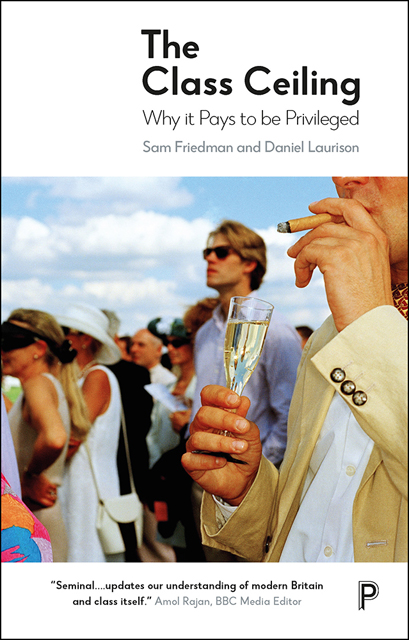Book contents
- Frontmatter
- Dedication
- Miscellaneous Frontmatter
- Contents
- List of figures and tables
- Acknowledgements
- Note on language usage
- Introduction
- one Getting in
- two Getting on
- three Untangling the class pay gap
- four Inside elite firms
- five The Bank of Mum and Dad
- six A helping hand
- seven Fitting in
- eight View from the top
- nine Self-elimination
- ten Class ceilings: A new approach to social mobility
- eleven Conclusion
- Epilogue: 10 ways to break the class ceiling
- Methodological appendix
- Notes
- References
- Index
Methodological appendix
Published online by Cambridge University Press: 14 April 2023
- Frontmatter
- Dedication
- Miscellaneous Frontmatter
- Contents
- List of figures and tables
- Acknowledgements
- Note on language usage
- Introduction
- one Getting in
- two Getting on
- three Untangling the class pay gap
- four Inside elite firms
- five The Bank of Mum and Dad
- six A helping hand
- seven Fitting in
- eight View from the top
- nine Self-elimination
- ten Class ceilings: A new approach to social mobility
- eleven Conclusion
- Epilogue: 10 ways to break the class ceiling
- Methodological appendix
- Notes
- References
- Index
Summary
Academics often tell suspiciously neat stories of the research process. Most often we package our methodology into a few formulaic paragraphs within an article or book and narrate fieldwork and decision-making as linear, rational and seamless. But research rarely plays out like this. In practice it is usually profoundly messy and disjointed. This project certainly was. The book you have in your hands is the result of a sprawling, often unwieldy, research collaboration that has spanned over four years. It was always an expansive, ambitious project, but also one that has suffered multiple false starts and wrong turns, and which is flawed in important ways. In this Appendix we aim to tell this story. And we try to do so as honestly and transparently as possible, giving readers a chronological picture of exactly how our fieldwork unfolded. At the end we also explore a number of more technical and conceptual issues, including how our own class backgrounds (and other demographic coordinates) affected our research, how we conducted interviews, how we define ‘elite’ occupations, how we measure social mobility, how and why we selected our case studies, how we constructed our statistical analysis, how we fed our research back to our case study firms, and the key limitations of the study.
Stumbling across a class ceiling
This project began entirely serendipitously. It was September 2014 and we had both recently started jobs at the London School of Economics and Political Science (LSE). Our offices were directly opposite one another. Initially working together on the BBC’s Great British Class Survey (GBCS), we were asked to contribute to a special issue of Sociological Review. While Daniel’s paper sailed through peer review, Sam’s did not. The paper, an attempt to use the GBCS to examine the experience of social mobility, received three reviews – two lukewarm, one savage. ‘In my view this is just bad science,’ concluded Reviewer 3, ‘and will ultimately damage the reputation of the author.’ Ouch.
The journal Editor, reacting, was tactful but direct – completely rewrite the paper, or withdraw. On the verge of accepting defeat, Sam shared the article with Daniel. Could something be salvaged? Daniel wasn’t sure. But he did agree that the paper contained one intriguing finding. Among those who had entered the GBCS ‘elite’, those from working-class backgrounds had incomes far lower than colleagues from more privileged backgrounds.
- Type
- Chapter
- Information
- The Class CeilingWhy It Pays to Be Privileged, pp. 239 - 284Publisher: Bristol University PressPrint publication year: 2019

